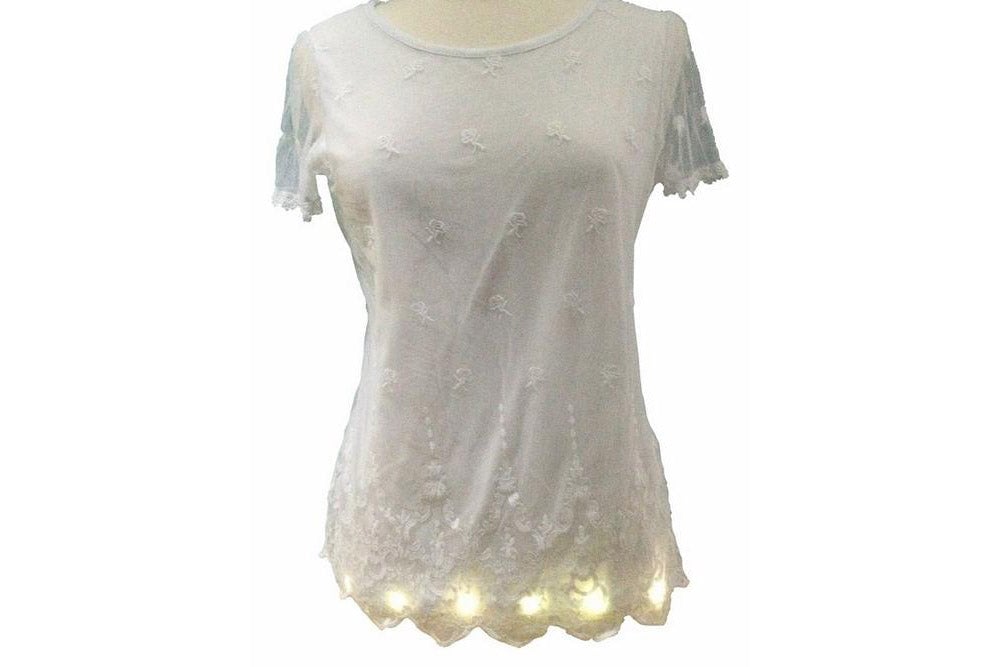Description
This project uses a mini cell holder and PCB LEDs to create a discrete circuit along the bottom of the hem on a t-shirt. The light shines through the fabric; in the example shown the t-shirt has a lace overlay and the light shines through both layers, creating a soft feminine look. The circuit is made up of 6 PCB LEDs which, like the mini cell holder, are small and easy to hide away. The components sit behind the hem with the stitching being on the inside of the hem only leaving a neat right side of the fabric. Any t-shirt can be used to create this project as long as it has a turned up hem that is at least 2cm wide. A switch is created by attaching the cell holder to a separate piece of fabric to which poppers have been attached. When these are joined up to poppers on the circuit, the LEDs light up. As well as acting as a switch, this also means the cell holder can be removed from the circuit to allow for washing. The garment with the LEDs and conductive thread in can be washed by hand in cool water. Do not iron the circuit or tumble dry the product. You are advised to do your own wash test of your circuit before adding it to your product.
Learn how to:
- Create a basic circuit using 6 PCB LEDs.
- Use a mini cell holder.
- Create a circuit with a removable popper switch.
- Hide a circuit in a hem.
Level of difficulty:
- Intermediate.
Parts list
In order to add the LEDs to your t-shirt you will need:
- a t-shirt with a turned up hem that is at least 2cm wide.
- Mini cell holder & cell.
- 6 white PCB LEDs.
- Conductive thread.
- 2 metal poppers.
- Ordinary sewing thread.
- Small piece of non fray fabric slightly bigger than the cell holder
You will also need the following equipment:
Step-by-step guide to adding PCB LEDs to a t-shirt
Step 1

Mark the position of the LEDs using a fade away or wash away pen. Do not use ordinary pencil or pen on your fabric as it is very difficult to remove.

Place the LED facing towards the fabric so that it can’t be seen & oversew the negative side hole to the inside of the hem. Keep the stitches tight and be careful to only sew through the top layer of the hem so that no stitches can be seen on the right side of the fabric. Don’t forget to make sure that the LED is facing the fabric so that the light can shine through it when the circuit is complete.

Stitch small running stitches through the top layer of fabric in the hem to reach the next LED. If the hem has an overlocked or cover seam hem, you could slide your thread under the stitches instead. Make sure that you can’t see your stitches on the right side of the fabric.

Oversew the negative side of the second LED. Repeat this process, sewing down the negative side of all 6 LEDs using the same length of thread.

After oversewing the final LED into place slide the thread through the hem to take it about 2cm away from the LED. Oversew one side of a popper onto the hem using the same length of thread making sure the stitches can’t be seen on the right side of the fabric. If you are running short of conductive thread only one hole in the popper needs to be attached using the conductive thread and the others can be secured using ordinary thread.
Step 2

Using a new piece of conductive thread oversew the positive side of the first LED to the hem.

Stitch small running stitches through the top layer of fabric in the hem to reach the next LED.

Oversew the positive side of the LED onto the hem. Repeat this process for the remaining LEDs.

After oversewing the final LED into place slide the thread through the hem to take it about 4cm away from the LED (and slightly further away from the popper on the negative side of the circuit). Oversew the second side of the popper onto the hem using the same length of conductive thread making sure the stitches can’t be seen on the right side of the fabric.

This part of the circuit can be washed in cool water. Do not iron the circuit or tumble dry. You are advised to do your own wash test before putting the circuit in your product.
Step 3

Place the cell holder onto the non fray fabric with the white board flat on the material. Place one side of a popper on the other side of the fabric (so that the fabric is sandwiched in between). Check which popper to use by looking at the one used on the circuit on the hem. You will need to make sure you are not using the same side of the popper otherwise it won’t close.

Stitch through the negative hole on the cell holder as well as through one of the holes on the popper. Do this several times into the same hole to make sure all of the layers are secure.

Stitch the remaining holes of the popper down onto the fabric. Note that the last 3 holes will not be attached to the cell holder. If you run out of conductive thread you can use ordinary thread for the last 3 holes.

The negative side of the cell holder is now attached to the popper.
Step 4

Using a new piece of conductive thread repeat the same process attaching the other popper to the positive side of the cell holder sandwiching the fabric in between the two.

The two remaining holes on the cell holder (the ones without the silver ring) are not part of the circuit and are there to add stability. They can be stitched into place using ordinary sewing thread.

Slide the cell into the cell holder making sure the positive side of the cell is facing upwards.

To turn on the circuit join the negative popper on the hem to the negative popper on the cell holder, and join the positive popper on the hem to the positive popper on the cell holder. Download a pdf version of this page here ![]() This tutorial was produced for Kitronik by Julie Boyd who is a specialist in e-textiles design.
This tutorial was produced for Kitronik by Julie Boyd who is a specialist in e-textiles design.




